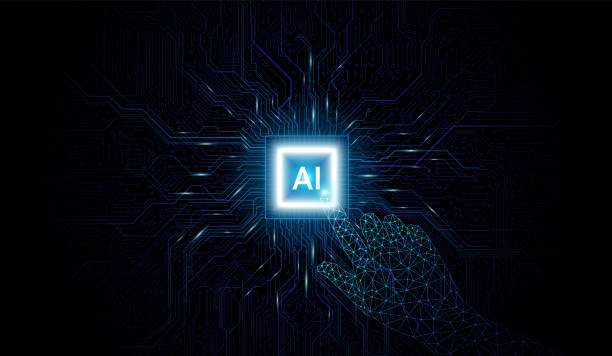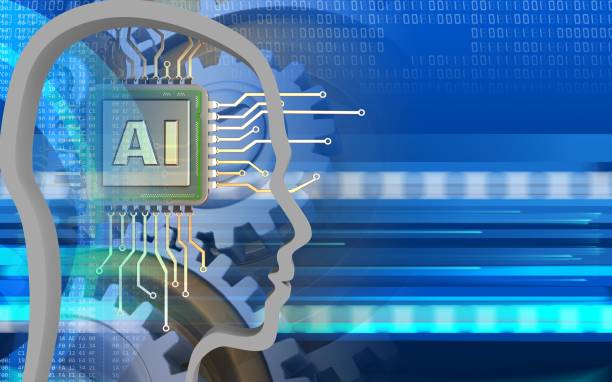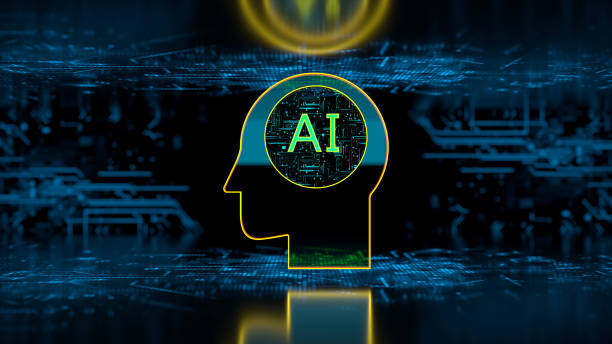What is Artificial Intelligence (AI) and How Does It Work?

#Artificial_Intelligence (AI) is a branch of computer science dedicated to building intelligent machines, especially intelligent computer programs.
Artificial intelligence strives to create systems that can perform tasks that typically require human intelligence, such as learning, problem-solving, pattern recognition, and decision-making.
In fact, the goal of artificial intelligence is to simulate human thinking processes in machines.
Artificial intelligence works through complex algorithms and mathematical models.
These algorithms allow machines to learn from data, identify patterns, and make decisions based on these patterns.
Some of the key methods in artificial intelligence include machine learning, deep learning, natural language processing, and computer vision.
Machine learning allows machines to learn from data without explicit programming.
Deep learning is a type of machine learning that uses artificial neural networks with multiple layers.
Natural language processing (NLP) enables machines to understand and generate human language.
Computer vision enables machines to see and interpret images.
All these techniques work together to enable artificial intelligence systems to perform complex tasks.
Artificial intelligence is rapidly advancing, and its applications are expanding into various fields.
Don’t have a company website yet and are missing out on online opportunities? With professional corporate website design by Rasaweb,
✅ Double the credibility of your business
✅ Attract new customers
⚡ Free consultation for your company website!
Types of Artificial Intelligence and Their Applications

Artificial intelligence is mainly divided into two categories: Narrow AI and General AI.
Narrow AI is designed to perform specific tasks and performs very well in performing that task.
Examples of narrow AI include movie and music recommendation systems, voice assistants like Siri and Alexa, and facial recognition systems.
Strong artificial intelligence, sometimes referred to as artificial general intelligence, is a type of artificial intelligence that can perform any task that a human can perform.
Strong artificial intelligence is still in the early stages of development, and there is still no strong artificial intelligence system.
However, research in this area is progressing rapidly.
The applications of artificial intelligence are very wide and diverse.
Artificial intelligence is used in healthcare for disease diagnosis, drug development, and providing personalized care.
In the automotive industry, artificial intelligence is used to develop self-driving cars.
In the financial industry, artificial intelligence is used for fraud detection, risk management, and providing customer service.
Also, artificial intelligence is used in education, agriculture, manufacturing, and many other fields.
Artificial intelligence is constantly changing and improving, and it is expected to play a more important role in our lives in the future.
Machine Learning and Its Role in Artificial Intelligence

Machine Learning is one of the main sub-branches of artificial intelligence that allows machines to learn from data without being explicitly programmed.
In other words, machine learning allows machines to identify patterns and relationships in data and use these patterns to make predictions or decisions.
There are different machine learning algorithms, each of which is suitable for a specific type of data and tasks.
Machine learning is divided into three main categories: Supervised Learning, Unsupervised Learning, and Reinforcement Learning.
In supervised learning, the machine is trained using labeled data.
Labeled data includes inputs and expected outputs.
In unsupervised learning, the machine is trained using unlabeled data and must identify patterns on its own.
In reinforcement learning, the machine learns by interacting with an environment and improves its strategies based on the feedback it receives.
Machine learning plays a very important role in the development of artificial intelligence systems.
Many applications of artificial intelligence, such as image recognition, natural language processing, and recommendation systems, are based on machine learning algorithms.
With recent advances in deep learning, which is a type of machine learning, the capabilities of artificial intelligence systems have increased dramatically.
| Algorithm | Type | Application |
|---|---|---|
| Linear Regression | Supervised | Price Prediction |
| Decision Tree | Supervised | Classification |
| K-Means Clustering | Unsupervised | Customer Segmentation |
| Neural Networks | Supervised/Unsupervised | Image Recognition |
Natural Language Processing (NLP) and Understanding Human Language

Natural Language Processing (NLP) is a branch of artificial intelligence that enables machines to understand, interpret, and generate human language.
The goal of NLP is to create systems that can interact with humans in their natural language.
NLP uses various techniques such as syntactic analysis, semantic analysis, and discourse analysis to understand human language.
The applications of NLP are very wide.
NLP is used to build chatbots and voice assistants.
Also, NLP is used in machine translation, information extraction, text summarization, and sentiment analysis.
With recent advances in deep learning, the capabilities of NLP systems have increased dramatically.
Large language models such as GPT-3 and BERT are able to understand complex texts and generate appropriate responses.
NLP plays an important role in improving human-machine interaction.
By using NLP, machines can better understand human needs and desires and provide better services.
Also, NLP can help automate many tasks that were traditionally done by humans.
Does your current website convert visitors into customers or drive them away? Solve this problem forever with professional corporate website design by Rasaweb!
✅ Create a strong brand and credibility
✅ Attract target customers and increase sales
⚡ Get a free consultation now!
Computer Vision and Image Recognition

Computer Vision is a branch of artificial intelligence that enables machines to see, interpret, and understand images and videos.
The goal of computer vision is to create systems that can extract meaningful information from visual data.
Computer vision uses various techniques such as object detection, face recognition, motion detection, and 3D reconstruction to analyze images.
The applications of computer vision are very diverse.
Computer vision is used in self-driving cars to detect obstacles and traffic signs.
Also, computer vision is used in disease detection, quality control, video surveillance, and robotics.
With recent advances in deep learning, the capabilities of computer vision systems have increased dramatically.
Convolutional Neural Networks (CNNs) are specifically designed for image processing and perform very well in object detection and other vision tasks.
Computer vision plays an important role in automating many tasks that were traditionally done by humans.
By using computer vision, machines can analyze images faster and more accurately than humans.
This can lead to increased productivity and reduced costs.
Challenges and Limitations of Artificial Intelligence

Despite the impressive advances in artificial intelligence, there are still many challenges and limitations that need to be addressed.
One of the main challenges is the need for large amounts of high-quality data to train artificial intelligence systems.
Machine learning algorithms need large amounts of data to learn patterns and relationships in the data.
Another challenge is bias in the data.
If the training data is biased, the artificial intelligence system will also be biased.
This can lead to unfair and discriminatory decision-making.
Also, the explainability of artificial intelligence systems is another important challenge.
Many deep learning algorithms act like black boxes, and it is difficult to understand how they arrived at a particular result.
This can reduce trust in artificial intelligence systems.
In addition, ethical and social issues related to artificial intelligence should also be considered.
The use of artificial intelligence in areas such as surveillance, autonomous weapons, and hiring can have serious consequences for human rights and individual freedoms.
It is necessary to establish appropriate laws and regulations to regulate the use of artificial intelligence.
Artificial Intelligence and Its Impact on Jobs

Artificial intelligence has and will have a significant impact on the labor market.
While artificial intelligence can automate some jobs, it also creates new job opportunities.
Jobs that involve repetitive and routine tasks are most at risk of automation.
However, jobs that require human skills such as creativity, critical thinking, and emotional intelligence will be less affected.
It is predicted that artificial intelligence will lead to the creation of new jobs in areas such as artificial intelligence development, data science, robotics engineering, and business analysis.
Also, artificial intelligence can help improve productivity and efficiency in many industries, which can lead to economic growth and create more job opportunities.
In order for people to be successful in the future labor market, they must acquire new skills and adapt to technological changes.
Continuous training and learning plays an important role in this field.
In this regard, policymakers and employers should help people acquire the skills needed for future jobs by providing appropriate training and support programs.
This can help reduce concerns about job loss and create a fair transition to the new artificial intelligence-based economy.
| Skill | Importance | Description |
|---|---|---|
| Machine Learning | High | Ability to design and develop machine learning models. |
| Data Science | High | Analyzing data and extracting useful information. |
| Emotional Intelligence | Medium | Ability to understand and manage emotions. |
| Critical Thinking | Medium | Ability to analyze information and make logical decisions. |
The Future of Artificial Intelligence and Predictions

The future of artificial intelligence is very exciting and full of potential.
It is predicted that artificial intelligence will play a more important role in our lives in the future and will create huge transformations in various industries.
In the field of healthcare, artificial intelligence can help with early diagnosis of diseases, providing personalized care, and developing drugs.
In the transportation industry, self-driving cars can increase safety and efficiency and reduce traffic.
In the field of education, intelligent systems can help provide personalized education and improve learning outcomes.
With recent advances in artificial intelligence, some experts believe that we will see the emergence of strong artificial intelligence in the not-too-distant future.
Strong artificial intelligence can perform any task that a human can perform and even surpass humans in some areas.
This can have profound implications for society and the economy.
However, the development of artificial intelligence must be done with caution and responsibility.
It is necessary to consider the ethical and social issues related to artificial intelligence and to establish appropriate laws and regulations to regulate the use of artificial intelligence.
By adopting a balanced and forward-looking approach, we can benefit from the enormous potential of artificial intelligence to improve human lives and create a better future.
The role of #Artificial_Intelligence in the future world is very vital.
Are you worried that your company’s old website is driving away new customers? Rasaweb solves this problem by designing a modern and efficient corporate website.
✅ Increases your brand credibility.
✅ Helps to attract targeted customers.
⚡ Contact Rasaweb for a free consultation!
Ethical and Social Aspects of Artificial Intelligence

The development and use of artificial intelligence has important ethical and social aspects that must be addressed.
One of the main issues is accountability for the decisions and actions of artificial intelligence systems.
If an artificial intelligence system makes a mistake, who will be responsible? The developer, the user, or the artificial intelligence system itself?
Another issue is privacy.
Artificial intelligence systems need a lot of data to learn and make decisions.
Collecting and using this data can infringe on people’s privacy.
It is necessary to establish appropriate laws and regulations to protect people’s data and privacy.
Also, bias in data and algorithms can lead to discrimination and inequality.
Efforts should be made to design artificial intelligence systems that are fair and unbiased.
#Artificial_Intelligence has a great potential to improve human lives, but its use must be done with caution and responsibility.
Finally, there needs to be a broad public conversation about the ethical and social aspects of artificial intelligence.
Different opinions and perspectives should be used to create a strong ethical framework for the development and use of artificial intelligence.
This framework should protect human rights and values and benefit all members of society.
How to Learn Artificial Intelligence?

Learning artificial intelligence can be an exciting and rewarding journey.
There are many resources for learning artificial intelligence, including online courses, books, articles, and practical projects.
To get started, you can familiarize yourself with the basic concepts of artificial intelligence, such as machine learning, natural language processing, and computer vision.
There are many online courses on platforms such as Coursera, edX, and Udacity that can help you learn these concepts.
Also, you can read various books in this field.
For practical learning of artificial intelligence, you can start small projects.
For example, you can create a simple image recognition system using the TensorFlow library.
Also, you can participate in open source artificial intelligence projects.
The most important thing for learning artificial intelligence is patience and perseverance.
Artificial intelligence is a complex and evolving field, so you should be prepared to spend a lot of time and effort learning.
However, with effort and perseverance, you can become an artificial intelligence expert and work in this thriving field.
Continuous learning and staying up-to-date with the latest advances in the field of #Artificial_Intelligence is of great importance.
Frequently Asked Questions
| Question | Answer |
|---|---|
| 1. What is Artificial Intelligence (AI)? | It is a branch of computer science that aims to create machines capable of simulating human intelligence and performing tasks that require human thinking, such as learning, problem-solving, and decision-making. |
| 2. What are the main types of Artificial Intelligence? | It can be classified into Narrow AI, which focuses on a specific task, General AI, which possesses comprehensive human capabilities, and Super AI, which surpasses human intelligence. |
| 3. Mention some common Artificial Intelligence applications in our daily lives. | These include voice assistants (such as Siri and Alexa), recommendation systems (such as Netflix and Amazon), self-driving cars, facial recognition systems, and spam filters. |
| 4. What is the difference between Artificial Intelligence and Machine Learning? | Artificial Intelligence is the broader concept of creating intelligent machines, while Machine Learning is a subset of Artificial Intelligence that focuses on enabling systems to learn from data without explicit programming. |
| 5. What is Deep Learning? | It is a subset of Machine Learning that uses multi-layered artificial neural networks (deep neural networks) to process data and discover complex patterns, and it is used in image and speech recognition. |
| 6. What are the main benefits of Artificial Intelligence? | Improving efficiency and productivity, automating repetitive tasks, making better decisions based on analyzing big data, and developing solutions for complex problems in fields such as medicine and science. |
| 7. What are the main challenges facing the development and deployment of Artificial Intelligence? | These include the need for vast amounts of high-quality data, privacy and security issues, bias in data and algorithms, and high development and maintenance costs. |
| 8. Does Artificial Intelligence raise ethical or social concerns? | Yes, it raises concerns about privacy, algorithmic bias, job loss due to automation, and responsibility for errors committed by intelligent systems, and the need for a regulatory framework. |
| 9. How can Artificial Intelligence affect the future of the labor market? | It can lead to the automation of some routine jobs, but it will also create new jobs that require advanced skills in developing, operating, and maintaining Artificial Intelligence systems. |
| 10. What are some modern or promising technologies in the field of Artificial Intelligence? | These include advanced Natural Language Processing (NLP) (such as large language models like ChatGPT), Computer Vision, Robotics, and Generative AI. |
And other services of Rasa Web Advertising Agency in the field of advertising
Intelligent social media: Transform SEO ranking improvement with the help of intelligent data analysis.
Intelligent customer journey map: Designed for businesses looking for online growth through user experience customization.
Intelligent content strategy: Professional optimization for customer behavior analysis using user experience customization.
Intelligent reporting: A combination of creativity and technology to increase click-through rates by using real data.
Intelligent UI/UX: A professional solution to increase click-through rates by focusing on SEO-oriented content strategy.
And more than hundreds of other services in the field of internet advertising, advertising consulting and organizational solutions
Internet Advertising | Advertising Strategy | Reportage Advertising
Resources
Why should artificial intelligence be taken seriously?
,The expansion of the artificial intelligence challenge; How does it change everyday life?
,Artificial intelligence expands security in the world of cyber
,Does artificial intelligence increase the risk? Why should we be worried
Are you ready to transform your business in the digital world? Rasaweb Advertising Digital Agency paves your way to online success by offering comprehensive services including professional website design, SEO, and social media management. Build your business future with us.
📍 Tehran, Mirdamad Street, next to the Central Bank, Kazerun South Alley, Ramin Alley No. 6
“`



